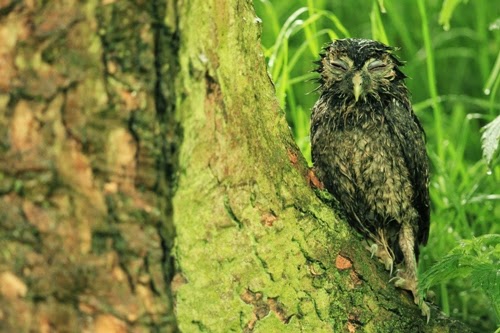on Galapagos and I promise I will but last week the tawny owl chicks got caught
out in the rain and I just had to share the pictures with you!
They had only just fledged when there was an almighty downpour which lasted two days!
The chicks are only about six
weeks old and hatched in an old elm tree around 70 yards from my house. I have some great footage below
of their first fledge.
Tawny owl chicks are adventurous
little things and they often attempt to fly the nest before they're ready. I have a nest box which is occupied every year in a field just below my house and I put food out on my bird table for the adult pair all year long. They have become so used to me they even bring their chicks to the garden to feed. Below is a painting of a chick that I watched fledge a few years back.
But sometimes the chicks end up falling to the ground. Normally they can climb back up tree trunks using their talons, wings and even
beaks if they have to. The problem comes when they
get soaked in heavy rain.
When they are young they are
still very fluffy and downy, and their feathers just soak up the water stopping
them from climbing back up the trees.
They are then susceptible to
predators so I picked this lot up and took them inside to dry off before putting
them back in their nest box.
They looked like they'd just been
dunked in a bucket full of water, but after a go under a hair dryer they were
fluffed up again and cozy!
I ended up having to rescue this four several times during the wet weather spell last week.
I wouldn't recommend doing this
at home – if you find a tawny owl it's ok to pick them up and put them on a branch so they are out of the way of predators but if their feathers are dry and they can still fly then it is better to leave them alone so that their parents can look after them.
It's also worth noting that tawny owls are very good parents and are usually close by so if you try to pick one up you can be at risk yourself from an aerial attack and it's quite sensible to wear goggles and a helmet if you do.
Otherwise please contact your local wildlife rescue centre for advice.






















